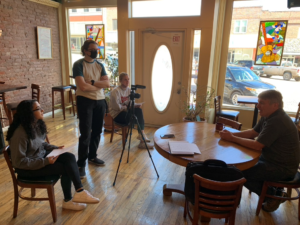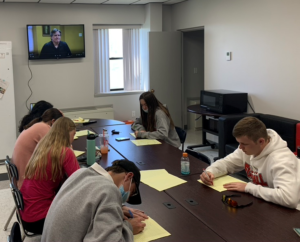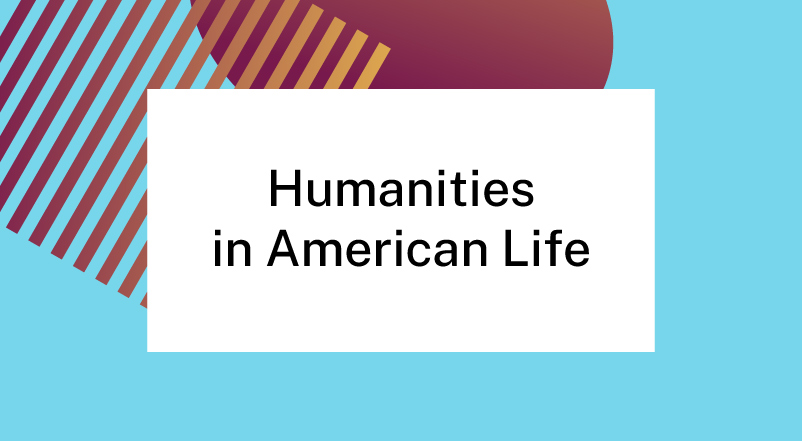Rural Rewards: An Economic Executive Director on the Strength of Small Towns
by Sydney Boyd, project manager, Humanities in American Life
 McCook, a rural town in southern Nebraska, doesn’t have a Dunkin’ Donuts; they have Sehnert’s Bakery and Bieroc Café, a James Beard-award-winning eatery that hosts Buffalo Commons Storytelling and Music Festival. McCook also doesn’t have a Sonic—instead they have Mac’s Drive-in, where you can drive up and order or go inside and pick up a phone on your table. The fifth generation of McCartys, the family who owns Mac’s, is in the process of taking over.
McCook, a rural town in southern Nebraska, doesn’t have a Dunkin’ Donuts; they have Sehnert’s Bakery and Bieroc Café, a James Beard-award-winning eatery that hosts Buffalo Commons Storytelling and Music Festival. McCook also doesn’t have a Sonic—instead they have Mac’s Drive-in, where you can drive up and order or go inside and pick up a phone on your table. The fifth generation of McCartys, the family who owns Mac’s, is in the process of taking over.
“We’re 70 miles south of Interstate 80, and then we’re 80 miles north of Interstate 70 that runs through Kansas in the middle of America, so we are just far enough off these main roads that we’ve had to develop the sense of independence…We have this fierce independence here, we do it the McCook way,” Andy Long, executive director of the McCook Economic Development Corp, told me.
Long spends a lot of time thinking about building communities, and a big part of that is educational and youth-focused programs that have flourished through the Smithsonian Museum on Main Street traveling exhibits.
“We work with about 10-15 high school students every year doing leadership development and also doing local business visits,” Long said. “And so when we had the chance to participate in Museum on Main Street…it was just a perfect fit for this leadership program.”
When “Crossroads: Change in Rural America” came to town, Long wanted to tell the stories of how McCook’s local businesses had to adapt in a rural landscape, and that storytelling helped spark new perceptions of rural living within his community.
 Students identified who they thought were successful local business owners that had been in business for decades in McCook and worked to come up with a list of questions. Like so many things during the pandemic, this project also shifted from sticking together in one big group to sending small groups of two or three students to record interviews with local business owners. When everyone reported back, the whole group of high school students watched the interviews together. Later, they edited all the interviews to create a video compilation.
Students identified who they thought were successful local business owners that had been in business for decades in McCook and worked to come up with a list of questions. Like so many things during the pandemic, this project also shifted from sticking together in one big group to sending small groups of two or three students to record interviews with local business owners. When everyone reported back, the whole group of high school students watched the interviews together. Later, they edited all the interviews to create a video compilation.
“They talked about what stood out to them, what they heard, what were some common themes,” Long said. “And with high school students, it’s fun, because almost every business owner said ‘This was not the best financial decision I could have made; I could have found a job where I made more money’ but they all said, ‘This was by far the best decision I ever did make, the opportunity to live here, to work here.’”
Long said part of his hope with this program was to plant a seed in these students’ minds: “You can be a McCook business owner someday.”
“These…people were not much different from you 30 or 40 years ago, and they loved this experience they had, even though it was extremely challenging,” Long said. “But they just love being a part of this community as a business leader…because everything else in education says ‘go to college, get a job with benefits, follow the rules.’”
The idea of living in a rural town has changed during the pandemic, Long said, so that there’s a lot of competition for talent across urban and rural communities.
“People have figured out that they can work from anywhere, and people can retire and move to just about anywhere they want to live,” Long said. “And so you really gotta be a community that people want to move to.”
Long noted that there are always incentives—like tax credits and other tools—to draw people in, but the real thing people are looking for is a vibrant community, and that’s a significant advantage rural communities have over urban environments—they are communities first and foremost, they know each other and care about each other.
“My wife and I, we just had our fourth child about three weeks ago,” Long told me. “We haven’t cooked since we brought her home. Every night, somebody else has brought a meal by…none of them are family members. That’s just kind of who we are—we support each other, we look out for each other. We’ve got our issues—we’ve got poverty, we’ve got housing issues, we’ve got early childhood education issues—but overall, you’ve got a variety of places that, no matter who you are, you can feel like you’re a part of a community here.”
Photo Credit: Andy Long


